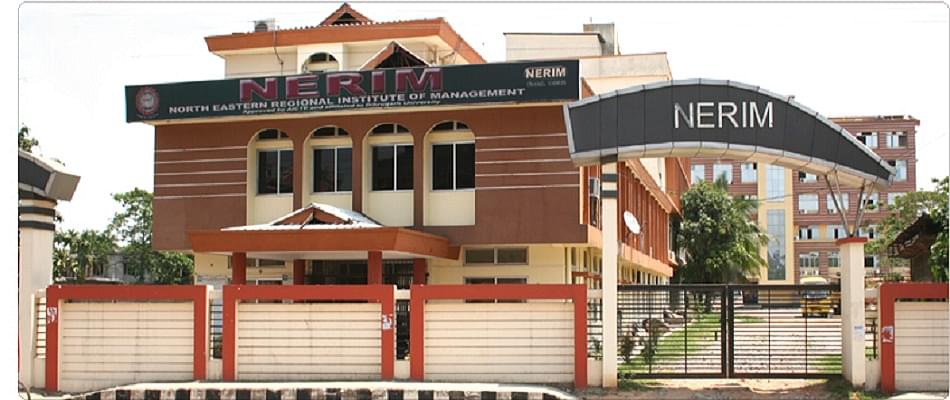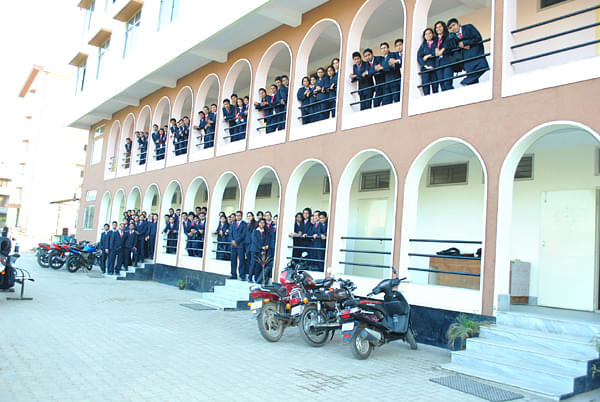Dr. Barsha Kalita is the Head of the Department of Social Work at the NERIM Group of Institutions. She is a PhD holder from Assam University, Silchar. A Delhi University and Jamia Millia Islamia alumnus, she has almost three years of experience in the educational sector. She has over 14 publications in the form of books, peer-reviewed journals, and UGC care list journals. During her tenure, Dr. Kalita has conducted various workshops, seminars, and programs.

What is the latest program that you are offering in your institute/dept. which will help students outperform and stand apart from the crowd?
The social work department focuses not only on theoretical knowledge but also on practical, hands-on experience in NGO and community settings. Our latest program “Medical Social Work, Community Development, and Human Resources Management,” focuses on equipping students to work in hospital settings, community settings, and industry settings. Further, our special focus is on fieldwork that makes the students well-qualified to make a meaningful impact on individuals and communities.
When you came to college, what was your vision and how you are trying to achieve the same?
When I started my journey as a social work faculty member in the NERIM Group of Institutions, I had the vision to empower youth through professional education. I want to prepare them to meet the challenges of a competitive world by instilling confidence and making them socially and ethically responsible professionals. I am trying to achieve the same by engaging with them in a learning environment through internships and fieldwork. I am trying to empower them by incorporating social work values, ethics, and principles into their personal as well as professional lives.
What will you say the best practices in the course you are offering?
In the Department of Social Work, we uphold several best practises to ensure our student’s comprehensive development. Firstly, through our fieldwork experience, we try to provide them with the opportunity to apply theoretical knowledge to practical scenarios in their everyday lives. We encourage them to question social norms, to critically analyse their experiences and values, and to work for the betterment of society by addressing various social issues. Further, collaborative learning, discussions, case studies, presentations, and activities stimulate the student’s learning experience, which also refines their skills and knowledge.
What are some valuable insights of the program that you are offering at your institute/department?
In the social work department, we emphasise empowering the students to prepare them to stand up for human rights and justice and be the voice of the unheard and marginalised populations. We try to inculcate the social work values of service, social justice, dignity and worth of individuals, and the importance of human relationships, integrity, and competence in our students to enable them to be the change agents of our society. Through our course, we polish our student’s skills so that they can emerge as advocates for social justice and create positive change in society.
Check NERIM Group of Institutions Courses & Fees
How does the program ensure that students are being prepared for the future?
The social work course is meticulously designed to equip students for the future landscape of social work. We emphasise critical thinking, adaptability, problem-solving skills, decision-making skills, teamwork, empathy, communication skills, active listening, organisation skills, self-care, cultural competence, patience, professional commitments, and advocacy skills to make them competent. The course prepares them to deal with various social issues and be professionally qualified for the job market.
How did you train yourself/ faculty to deliver this program to the students?
Faculty readiness is an important component of a teacher’s training. The faculties of the department designed the curriculum in a manner that identified the learning objectives of the program. The main agenda is to help the students impart knowledge, skills, and attitudes. The contents of the curriculum are broken down into modules, sub-topics and sessions, and necessary course materials were created for each session in this format. These included lecture notes, readings, case studies, videos, and interactive activities. Plan your lectures based on the curriculum. Appropriate assessment methods were developed to measure students' understanding and progress. These included quizzes, assignments, projects, presentations, and exams.
Any suggestion you would like to give to the current youth and the aspiring students?
In this rapidly evolving world filled with opportunities and challenges, my suggestion to the current youth and aspiring students is to embrace a mindset of continuous learning, adaptability, and purpose-driven action. As they navigate their educational journey and prepare to step into the professional realm, they must remember that success is a culmination of not just academic excellence, but also a blend of creativity, resilience, and interpersonal skills. They must be encouraged to cultivate a genuine curiosity for the world around them, seek knowledge beyond textbooks, and explore diverse disciplines to foster a well-rounded perspective.
What were the challenges that you faced while inculcating this program in your curriculum?
Incorporating this programme into the curriculum presented both opportunities and challenges. One major challenge was aligning traditional teaching methods with the programme’s emphasis on experimental learning and technology integration. Adapting the curriculum to address emerging social issues and trends required ongoing updates and consultations with experts. Additionally, ensuring that faculty members were well-equipped to deliver this innovation programme demanded intensive training and development efforts. Overcoming these challenges required collaboration among teachers, administrators, students, and parents.
What are the types of projects that the students are working on through this program?
Students of social work engage in a wide range of projects during their programmes to gain practical experience and apply their theoretical knowledge in real-world settings. The specific types of projects can vary based on the program, specialisation, and needs of the community or population they are serving. Some common types of projects that social work students work on are community needs assessments. Students also conduct research to identify the needs and challenges faced by a particular community or population. This assessment helps in designing targeted interventions and services.
Social work students engage in advocacy efforts to raise awareness about social justice issues, lobby for policy changes, and work towards creating a more equitable and just society. Group work is a common aspect of social work. Students might lead support groups, therapy groups, or workshops to address topics such as grief, addiction recovery, parenting skills, and more. Social work students are posted in agencies for fieldwork in schools, providing counselling, conflict resolution, and support services to students, teachers, and families.
Check NERIM Group of Institutions Scholarship
What are the benefits and career options after pursuing this course?
After completion of this course, one’s skills are refined, and their conscience becomes clear as to what a candidate would want to do in their career. Pursuing a career in Social Work is demanding; however, the benefits include witnessing society grow and develop. The scope and career options are plenty, as a social work course trains a candidate to be more mature and sensitive towards society and help people who are barely making it through the day, assisting people in getting jobs that can help a family survive in these tough times. Social workers can work as therapists or counsellors, medical social workers, school social workers, hospice social workers, community outreach workers, human service specialists, probation officers, behavioural management aides, substance abuse counsellors, and foster care social workers in government as well as non-governmental settings.

![NERIM Group of Institutions - [NERIM]](https://image-static.collegedunia.com/public/college_data/images/appImage/1593459187Cover.jpg?h=240&w=1000&mode=crop)
![NERIM Group of Institutions - [NERIM]](https://image-static.collegedunia.com/public/college_data/images/logos/1625290156head.jpg?h=71.17&w=71.17&mode=crop)













![Third Eye College - [TEC]](https://image-static.collegedunia.com/public/college_data/images/appImage/57585_cvr.png?h=111.44&w=263&mode=crop)







![Flywayy Institute of Air Hostess Training - [FIAT]](https://image-static.collegedunia.com/public/college_data/images/appImage/undefined?h=111.44&w=263&mode=crop)

![Assam Institute of Management - [AIM]](https://image-static.collegedunia.com/public/college_data/images/appImage/17261_AIM_New.png?h=111.44&w=263&mode=crop)

![MBA/PGDM | admission | 2024 | Narsee Monjee Institute of Management Studies - [NMIMS Deemed to be University]](https://image-static.collegedunia.com/public/college_data/images/logos/1506323004Logo.jpg?h=72&w=72&mode=crop)




![MBA/PGDM | admission | 2024 | Indian Institute of Management - [IIMC]](https://image-static.collegedunia.com/public/college_data/images/logos/1488950580d2.png?h=72&w=72&mode=crop)




 “
“
















.png?h=72&w=72&mode=crop)
.png?h=72&w=72&mode=crop)
.png?h=72&w=72&mode=crop)
.png?h=72&w=72&mode=crop)
.png?h=72&w=72&mode=crop)

![Royal Global University - [RGU]](https://image-static.collegedunia.com/public/college_data/images/logos/1624941524logofinalJPEG.jpg?h=72&w=72&mode=crop)

![Girijananda Chowdhury Institute of Management & Technology - [GIMT]](https://image-static.collegedunia.com/public/college_data/images/logos/1714384620Other.png?h=72&w=72&mode=crop)
![University of Science and Technology - [USTM]](https://image-static.collegedunia.com/public/college_data/images/logos/1421309174University_of_Science_and_Technology,_Meghalaya_seal.jpg?h=72&w=72&mode=crop)
![Assam down town University - [ADTU]](https://image-static.collegedunia.com/public/college_data/images/logos/1714548748adtunewlogo.png?h=72&w=72&mode=crop)

![Assam Don Bosco University - [ADBU]](https://image-static.collegedunia.com/public/college_data/images/logos/1685714174logo.png?h=72&w=72&mode=crop)




![Gauhati University - [GU]](https://image-static.collegedunia.com/public/college_data/images/logos/1394864857Gauhati University.png?h=72&w=72&mode=crop)


![Asian Institute of Management and Technology - [AIMT]](https://image-static.collegedunia.com/public/college_data/images/logos/1588338362aimtlogo.png?h=72&w=72&mode=crop)




Comments